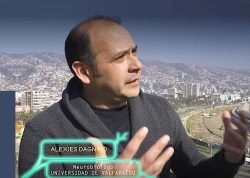Ciesal researcher appears on TVN cultural channel
4/10/2024Ciesal researcher appears in scientific programme on TVN’s cultural channel
Dr. Alexies Dagnino discussed stress and resilience on TVN’s scientific show ‘Neurópolis’

Ciesal researcher Alexies Dagnino appeared in a scientific programme on Televisión Nacional de Chile’s cultural channel -NTV- as an expert in the area of stress and resilience. The programme ‘Neurópolis’, sponsored by the National Television Council, is hosted by Bruno Rossi, a neurobiologist with a PhD in Biology and winner of an alternative Nobel Prize for his study on the movements of dinosaurs.
The idea of the programme, on which the CIESAL researcher was interviewed, was to discover how our brain works, how it reacts to challenging situations and, most importantly, ‘how we can train it to overcome adversity, strengthen ourselves in the face of stress and learn about the neural mechanisms that allow us to adapt and thrive’. In this context, the programme encourages a journey ‘towards a stronger and more resilient mind’.
Dagnino, who has a long career in the study of stress – considered a silent epidemic of the 21st century – is a neurobiologist, with a PhD in Biomedical Sciences from the Universidad de Chile and professor at the Universidad de Valparaíso. He has undertaken numerous research projects at leading universities in the United States and the United Kingdom, such as Stanford University and the University of Brighton, specialising in the effects of stress on mental health, specifically in the neurobiological bases of resilience to stress and the relationship between stress and the origin of mental illnesses such as depression and anxiety disorders.
During the programme, Dagnino explained that stress is not a disease in itself, but rather a factor that can trigger mental pathologies: ‘It is a concept related to our ability to adapt to the physical environment we live in and also to the emotional environment, However, it is not a negative thing in every circumstance, because despite the stress of the urban life we lead, one can, for example, still manage to engage in a conversation. The problem is that when we do not adapt to stress it generates toxic effects in the brain that make it more vulnerable, mainly to mental illnesses related to mood disorders. Stress, then, is not a disease, but an environmental risk factor that, because of our current lifestyle, makes our brain more prone to such diseases.
The episode of Neurópolis, in which Dagnino participated, entitled ‘Stress and resilience’, was broadcast on Tuesday 2 October and will be rebroadcast this Saturday 6 October at 23:00.
The programme is available at:_



